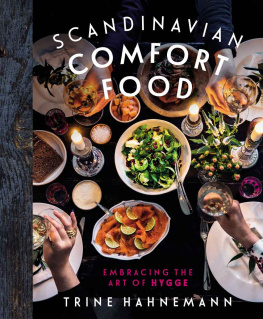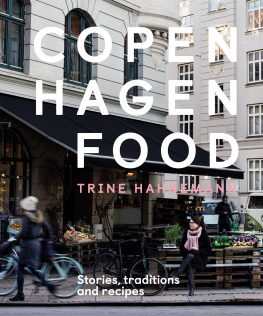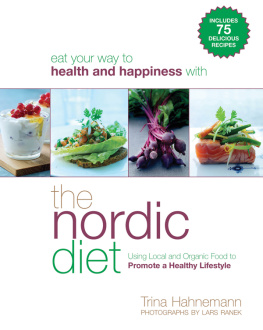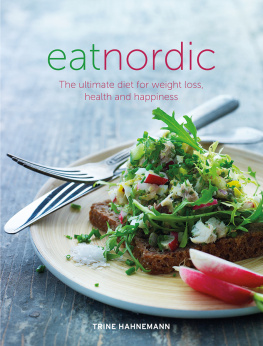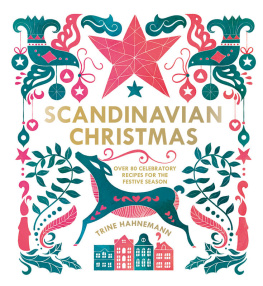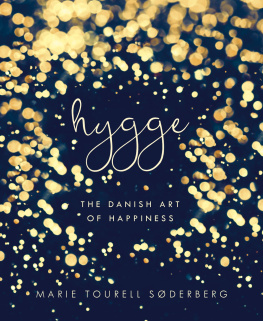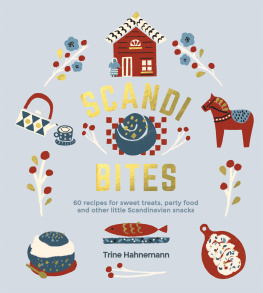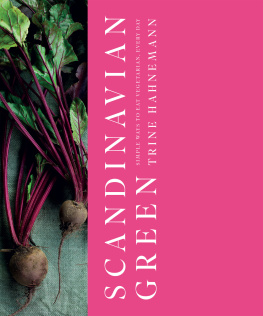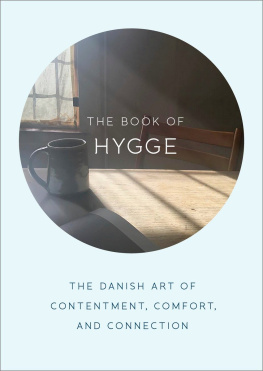I live a life that revolves around food. I cook, I write, and I own and run a companythat cooks and serves lunch for 3,000 people every day in Copenhagen. All my workis based around food organic and sustainable and a good life. In a Danish contextthis always somehow involves hygge a concept that I describe on .
To describe hygge is difficult because it is so embedded in our culture. Its notcosiness as such; its a feeling and an expectation, an everyday part of the Danishlanguage. This book is about the way I cook and eat and that will, in turn, inevitablybecome a story about hygge since its so ingrained in our food culture. Even theabsence of hygge is defined and recognized.
The book is divided into chapters that reflect the way I eat and cook. What I EatDuring the Day is a range of light recipes for late breakfast and lunch that couldeasily be turned into dinner. My familys stories and traditions are the focus ofOur Family Meals I hope that most people can find time to eat together regularly.I share some of my celebrations with friends and family through the year in EasterHygge, Friends over for Christmas Lunch and Christmas
Dinner at my House. It is inevitable that I should write about My Love of Vegetables,because I enjoy cooking them so much, and I eat a lot of them. In Soups for EverySeason the recipes are both new and classic. Youll see that I use a lot of vegetablesmixed with grains, herbs and spices in The Salads I Eat. Finally, as well as vegetables,I could easily live on The Breads I Bake and Something Sweet.
I am not a fan of food trends that dictate rules about what we should and shouldnteat; just keeping up with all the rules is stressful. I believe in the importanceof food culture, both historically and currently. Eat balanced food, follow the seasons,be responsible, enjoy eating, and make room to indulge now and then. I juice, I eatgrains, meat, fish, and lots of cooked and raw vegetables, but I also appreciatecake, and a glass of wine.
Nothing is more vital to me than to have a great time around food with other people.To cook and share: that is our biggest asset in life. I hope this book will inspireyou to make life hyggeligt every day, and to cook for friends, strangers, neighbours,lovers and family.
Velbekomme!
We all have to eat that is stating the obvious but to eat in our modern Westernworld, we do not have to cook. We have the choice to eat enough calories every daywithout ever getting near a kitchen. It will surprise no one that I think that isa disaster. Cooking has many functions, and one is making sure that biodiversityis on our plates, which in practice means using a wide range of ingredients overthe shifting seasons. Processed foods tend to streamline ingredients so that theyget the same process every time. Therefore, you have to eat real cooked food.
I believe very strongly in organic produce, and for one simple reason: I do not wantany toxic chemicals in my food. I like to eat clean, tasty, and fair food.
So I try to eat as much organic as possible. All my dairies like milk, cheese, andyogurt are organic; I only bake with organic flour; all eggs and chicken I eat areorganic; I only buy organic meat, and the way I can afford that is by only eatingmeat twice a week. My herbs, I grow myself. All basic vegetables like carrots, onion,garlic, potatoes, and root vegetables are organic. Then I try to buy organic forall the rest as well. Over the last ten years it has become much easier to live organicin Denmark because demand is rising, so supply is growing. Organic has become importantbusiness for supermarket growth strategy.
People often complain that organic, certified or not, is more expensive. I say thatis not true not when you understand what goes into growing food. Visit a farm.When did we decide food has to be inexpensive? That decision also comes with a cost,which is our quality of life. The other thing is: also think about eating less, andnot wasting food. That will translate directly into your budget. A further idea isto make sure that supermarkets are not driving prices up, so try to buy directly:go to farmers markets, subscribe to a box scheme wherever you live, and join a co-upor start one in your own community.
I am not a scientist who can explain elaborately, what the problem with non-organicfood is. For me its common sense. Spraying toxic chemicals on our soil and produce,asking farmers to work in that environment, is wrong and at the same time messeswith natures laws, which is asking for disaster. I think toxic chemicals sprayedin nature harm our health; I do not believe you can qualify that statement. Therefore,my dream is that in the next 100 years the world of agriculture will turn organic.I simply do not believe that we cant feed this planets population on organic food.Mother nature is so clever; we can find that balance. We need to do this wisely,taking all external factors into account.
We have to grow our food in a sustainable way, not waste it. We need to have timeto cook and have fun when working in the kitchen. It makes us understand the significanceof taste from clean produce, how all these wonderful colourful vegetables that comefrom the soil can turn into wonderful dishes that make our life enjoyable. Its abouthaving a good life, and I truly believe eating and cooking are a key factor in realizingthat!
For a cook its very simple: you are never better than your produce. This goes forhome cooks as well. So, cooking real food also implies that you have to source responsibly.There is a beautiful biological system going on that my farmer friends have explainedto me. I love to visit people working in the organic agriculture business and seehow their work flourishes. All my knowledge comes from these visits. When I cook,I like to think I support the farmers hard work.
Growing organic food in a mix of small and large polyface farms is a way to guaranteea better future for our planet. Polyface means that you have both crops and animalsand that you grow a diversity of grains, plants, and vegetables. Its like farmingin the old days before monoculture factories alienated from nature began to dominate.We do not have to turn back the clock, or start using horses again. It can be donewith technology, using all the knowledge we have available today.
I believe as a citizen of this world that we have enormous responsibilities whenit comes to how to source the things we eat. We have the power to make changes bytaking concise and deliberate decisions when we spend our money on food. I want tospend my money on food grown responsibly, on farms full of life and full of peoplewho work there farms that allow nature to be part of the daily life that growsthere. I would like to be able to pay a visit, go out into the field, and pull upa carrot from the soil without fearing it will kill me when I eat it.

